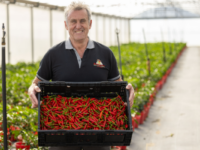Amidst the competition in the health and wellness segment, vitamin and supplement brand Vitaceuticals has managed to carve out a unique space by seamlessly integrating pharmaceutical expertise with holistic health solutions. Its growth has been a product not only of research and keen observation of health and wellness trends but also of strategic initiatives and partnerships that have helped make the product across the country. This week, we talk to Vitaceuticals co-founders, the husband and wife team of Michael (who serves as CEO) and Sally Tadros to talk more about the brand’s growth journey.
ISB: How did you come together and start Vitaceuticals?
ST: In 2015, my sister and cousin purchased a compounding pharmacy. Not long after, we noticed a high demand for Ferrous Gluconate, a specific iron salt often prescribed by obstetricians for its superior absorption and gentler effect on the digestive system. Since it wasn’t available for purchase in Australia, we struggled to keep up with requests. To meet the growing demand, we partnered with a TGA-registered manufacturer to produce it locally. A similar demand arose for compounded Magnesium Glycinate, frequently requested by leading neurologists at the RPA Medical Centre. As our portfolio expanded, we saw the need to create a brand that could bring these products together under one identity. That’s how Vitaceuticals was born. Founded by pharmacists Cyndi Khawaja, Yohana Boctor, and myself, alongside my husband, Michael Tadros, who serves as CEO, we are committed to delivering high-quality, science-backed supplements.
ISB: Vitaceuticals has scaled from compounding to being stocked in nearly 4,000 stores. What were the biggest operational challenges in making that leap?
ST: For pharmacy wholesalers to consider distributing your product, there must first be demand from retail pharmacies. We initially shipped our products directly to pharmacies, and as more pharmacy groups began stocking them, we built a strong foundation to approach wholesalers for broader distribution. As we continued to grow, we partnered with a sales broker to expand into national retail. However, this came with challenges, as brokers require a monthly retainer to represent your brand.
ISB: What strategies have been most effective in managing supply chain logistics as demand for your products has grown?
MT: Having good key partnerships with logistic providers is one of the most effective strategies for managing supply chain logistics as demand for product grows as this ensures that the logistics operations are well-coordinated and can handle the increased demand efficiently. It is important to have effective demand management processes, including accurate demand forecasting to help balance supply with demand, minimise waste, reduce cost and ensure customer satisfaction by maintaining stock levels.
ISB: As a business founded by pharmacists, how do you balance the scientific rigor of pharmaceuticals with the commercial realities of retail?
MT: Pharmacists are naturally honest and caring, we take pride in recommending products that truly work. If a better alternative exists, we want to offer it. In the magnesium space, we recognised that the best option was only available through compounding. The overwhelmingly positive feedback from our customers about how great they felt reinforced our decision to bring MagZorb Magnesium Glycinate to the market, making it the first TGA-listed Magnesium Glycinate product in Australia.
ISB: What is your vision for Vitaceuticals in the next couple of years?
MT: We currently have 13 SKUs with another 4 coming out in the next 6 months.
We have doubled our growth year on year for the past 4 years, and we envision that we will continue to do so. We want to provide our customers with the highest quality, highest bioavailable and best combination of ingredients for key problem areas in health.
ISB: What is the most important lesson you’ve learned in this business journey that aspiring entrepreneurs should take to heart?
MT: The power of resilience. Building a successful business is rarely a smooth journey. However, it’s the ability to persevere through these tough times, learn from mistakes, and continuously adapt that truly sets successful entrepreneurs apart. Resilience is not just about enduring hardships; it’s about maintaining a positive outlook and staying committed to your vision, even when the odds seem stacked against you. It’s about being flexible enough to pivot when necessary and having the courage to take calculated risks. This mindset not only helps in overcoming obstacles but also in seizing opportunities that others might overlook. In essence, resilience fuels innovation and growth, enabling entrepreneurs to turn their dreams into reality despite the inevitable hurdles along the way. So, for anyone looking to make their mark in the business world, cultivating resilience is a lesson that can make all the difference.















